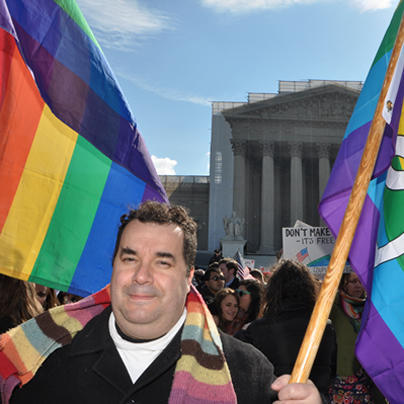Politics
DOMA ruling quickens march toward marriage equality
Officials in Ohio, Pa., Missouri, N.M. cite court decision


The Supreme Court decision against DOMA has boosted marriage equality activism. (Washington Blade photo by Michael Key)
Not even one month after the Supreme Court’s historic decision striking down Section 3 of the Defense of Marriage Act, the effects of the ruling are already proliferating as legal authorities throughout the country reinterpret laws to advance marriage rights for gay couples.
Almost like a domino effect, public officials and judges in Ohio, New Mexico, Pennsylvania and Missouri this week alone have acted to advance marriage equality by drawing on the decision in Windsor v. United States as part of their reasoning.
Doug NeJaime, a gay law professor at the University of California, Irvine, said this movement so soon after the Windsor ruling “was anticipated” given the language that Associate Justice Anthony Kennedy used in his opinion.
“Given the flurry of activity, and the quick decisions coming out of places like Ohio, this may mean that the Supreme Court may not be able to avoid the question regarding the constitutionality of state marriage bans as long as some of the justices may hope,” NeJaime said. “Clearly in Perry they were able to push the issue off for a bit, but it doesn’t seem they will be able to avoid the question for more than a few years at most.”
In Ohio, U.S. District Judge Timothy Black drew on the precedent set in Windsor as part of his reasoning in his 15-page decision affording a temporary order requiring Ohio to recognize the marriage of James Obergefell and John Arthur.
“While the holding in Windsor is ostensibly limited to a finding that the federal government refuse to recognize state laws authorizing same-sex marriage, the issue whether States can refuse to recognize out-of-state same-sex marriages is now surely headed to the fore,” Black writes. “Indeed, just as Justice Scalia predicted in his animated dissent, by virtue of the present lawsuit, ‘the state law-shoe’ has now dropped in Ohio.”
In Missouri, the State Supreme Court has asked attorneys involved in a gay death benefits case for an additional briefing in light of the Supreme Court’s decision against DOMA. Kelly Glossip was denied the benefits of her partner, Missouri State Highway Patrol Cpl. Dennis Engelhard, who died in the line of duty in 2009.
In Pennsylvania’s Montgomery County, where the County Commission has directed clerks to distribute marriage licenses to gay couples, the Windsor decision is cited again. Democrat Josh Shapiro is indirectly quoted by the Associated Press as saying the commission believes it has authority to distribute marriage licenses because of the Supreme Court decision against DOMA.
New Mexico Attorney General Gary King also makes reference to Windsor in his 29-page opinion in which he announces he won’t defend a state law in a lawsuit seeking marriage equality. But the decision here is mentioned briefly in a citation along with state marriage lawsuits such as Massachusetts’ Goodridge v. Department of Public Health and Iowa’s Varnum v. Brien.
New application of the Windsor decision can also be seen at the federal level. On Thursday, the Federal Election Commission is set to vote on allowing married same-sex couples to make joint political donations from an individual bank account.
The FEC has previously determined that married gay couples were ineligible to make such contributions under DOMA, but with Section 3 of that law deemed unconstitutional, the commission on Friday published a new draft opinion saying it “now revisits the question.”
Suzanne Goldberg, a lesbian and co-director of Columbia University’s Center for Gender & Sexuality Law, said the “pace has been quick, and it’s only getting quicker” with respect to the advancement of marriage equality after the DOMA ruling.
“Part of the cascade of change in the direction of marriage equality comes from the power of Justice Kennedy’s decision striking down DOMA,” Goldberg said. “They could have won, but with a less powerful opinion, which might not have motivated as many government officials to advance marriage equality, but the opinion is powerful and makes clear that discrimination in marriage is unconstitutional.”
In addition to the DOMA ruling, Goldberg also attributed the advancement of marriage equality to elected officials wanting to catch up to other politicians who have endorsed same-sex marriage. Additionally, she said a general cultural shift in the United States and high degree of acceptance of the court ruling is responsible.
“There can be no question that momentum has been building over the past two years, and it’s increased dramatically with the court striking down DOMA,” Goldberg concluded. “I think we can expect the pace of change to continue, but with bumps along the way.”
Congress
MTG resigns after years of anti-LGBTQ attacks amid Trump feud
Greene’s abrupt departure adds fresh uncertainty to an already fractured Republican Party.

Rep. Marjorie Taylor Greene announced on Friday that she is resigning from Congress.
In a post on X (formerly Twitter), the Georgia 14th Congressional District representative announced her sudden decision to resign from office.
The nearly 11-minute-long video shows Rep. Greene stating she will step down from her role representing one of Georgia’s most Republican districts on Jan. 5, 2026. She cited multiple reasons for this decision, most notably her very public separation from Trump.
In recent weeks, Greene — long one of the loudest and most supportive MAGA members of Congress — has butted heads with the president on a slew of topics. Most recently, she supported pushing the DOJ to release the Epstein Files, becoming one of only four Republicans to sign a discharge petition, against Trump’s wishes.
She also publicly criticized her own party during the government shutdown. Rep. Greene had oddly been supportive of Democratic initiatives to protect healthcare tax credits and subsidies that were largely cut out of national healthcare policy as a result of Trump’s “Big Beautiful Bill,” passed in July.
“What I am upset over is my party has no solution,” Greene said in October.
Trump recently said he would endorse a challenger against the congresswoman if she ran for reelection next year, and last week went as far as to declare, “Marjorie ‘Traitor’ Green is a disgrace to our GREAT REPUBLICAN PARTY!” on his Truth Social platform.
Trump told ABC News on Friday night that Greene’s resignation is “great news for the country,” and added that he has no plans to speak with Greene but wishes her well.
Despite her recent split with the head of the Republican Party, Rep. Greene has consistently taken a staunch stance against legislation supporting the LGBTQ community — notably a hardline “no” on any issue involving transgender people or their right to gender-affirming care.
Rep. Greene has long been at odds with the LGBTQ community. Within her first month in office, she criticized Democrats’ attempts to pass the Equality Act, legislation that would bar anti-LGBTQ employment discrimination. She went as far as to suggest an apocalypse-like scenario if Congress passed such a measure.
“God created us male and female,” she said on the House floor. “In his image, he created us. The Equality Act that we are to vote on this week destroys God’s creation. It also completely annihilates women’s rights and religious freedoms. It can be handled completely differently to stop discrimination without destroying women’s rights, little girls’ rights in sports, and religious freedom, violating everything we hold dear in God’s creation.”
Greene, who serves one of the nation’s most deeply red districts in northwest Georgia, attempted to pass legislation dubbed the “Protect Children’s Innocence Act,” which would have criminalized gender-affirming care for minors and restricted federal funding and education related to gender-affirming care in 2023. The bill was considered dead in January 2025 after being referred to the House Committee on the Judiciary.
Her push came despite multiple professional medical organizations, including the nation’s largest and most influential — the American Medical Association — stating that withholding gender-affirming care would do more harm than any such care would.
She has called drag performers “child predators” and described the Democratic Party as “the party of killing babies, grooming and transitioning children, and pro-pedophile politics.”
Greene has also publicly attacked Delaware Rep. Sarah McBride, the nation’s first and only transgender member of Congress. She has repeatedly misgendered and attacked McBride, saying, “He’s a man. He’s a biological male,” adding, “he’s got plenty of places he can go” when asked about bathrooms and locker rooms McBride should use. Greene has also been vocal about her support for a bathroom-usage bill targeting McBride and transgender Americans as a whole.
She has repeatedly cited false claims that transgender people are more violent than their cisgender counterparts, including falsely stating that the 2022 Robb Elementary School shooter in Texas was transgender.
The former MAGA first lady also called for an end to Pride month celebrations. She criticized the fact that the LGBTQ community gets “an entire” month while veterans get “only one day each year” in an X post, despite November being designated as National Veterans and Military Families Month.
Under Georgia law, Gov. Brian Kemp (R) must hold a special election within 40 days of the seat becoming vacant.
The Washington Blade reached out to both the White House and Greene’s office for comment, but has not heard back.

PFLAG honored U.S. Rep. Maxine Waters (D-Calif.) with the “2025 PFLAG National Champion of Justice” award during their annual “Love Takes Justice” event in Washington.
Waters has represented California’s 43rd Congressional District — including much of Los Angeles — since 1991 and has been a vocal advocate for LGBTQ rights since her swearing-in.
Her track record includes opposing the Defense of Marriage Act, which would have made marriage only between a man and a woman; co-sponsoring the Respect for Marriage Act, ultimately requiring all U.S. states to recognize same-sex marriages performed by other states; and is a long time supporter of the Equality Act, which would codify comprehensive protections for LGBTQ Americans.
In addition to her work on marriage equality, she also created the Minority AIDS Initiative to help address the devastating impact of HIV/AIDS on minority communities, particularly communities of color.
The award reception took place Tuesday at the headquarters of the American Federation of Teachers, where Waters was presented with the award by former U.S. Rep. Barney Frank (D-Mass.), the openly gay member of Congress. Frank praised Waters for her unwavering support for the LGBTQ community and her lifelong commitment to advancing equality for all.
“One of the most encouraging developments in the fight for human rights is the failure of those who traffic in any form of bigotry, including bigotry to divide the Black and LGBTQ+ communities,” said Frank, who came out in 1987 while in office. “No one deserves more recognition for strengthening our unity than Maxine Waters.”
During the reception, Waters spoke about her extensive history of LGBTQ advocacy within the halls of Congress, emphasizing that her idea of government centers around uplifting its most vulnerable and threatened communities.
“From the very beginning of my public life I’ve believed that the government must protect those that are vulnerable, including LGBTQ+ people, who have been pushed to the margins, criminalized and told that their lives and their love do not matter,” Waters said. “Discrimination has no place in our laws.”
She continued, adding that the discrimination LGBTQ people have dealt with — and continue to deal with — is unconstitutional and wrong.
“I am proud to stand with LGBTQ+ families against efforts to write discrimination into our constitution, against attempts to deny people jobs, housing, healthcare and basic dignity because of who they are or who they love,” she said.
Waters joins a slew of other LGBTQ advocates who have received this award, beginning with the late-Georgia Congressman John Lewis in 2018. Past honorees include Oakland (Calif.) Mayor Barbara Lee, who was then a member of Congress, U.S. Sen. Tammy Baldwin (D-Wis.), Frank, Colorado Gov. Jared Polis, who was then a member of Congress, and Speaker Emerita Nancy Pelosi (D-Calif.).
PFLAG CEO Brian Bond commented on the continued fight for LGBTQ rights in the U.S. as anti-transgender rhetoric and policies coming from the Trump-Vance White House grow each week.
“LGBTQ+ people and their families — and all of you here — know too well the reality of the political climate, the attitudes of the public, and the sheer lack of respect that LGBTQ+ people are experiencing in the world today. There’s no end to the hostile barrage of harmful laws, city ordinances, and regulations, especially against our trans loved ones,” Bond said. “This particular moment in history calls us to increase and fortify our work, advocating at every level of government.”
He ended with some hope — reminding the LGBTQ community they have been on the receiving end of discrimination and unjust treatment before, but have risen above and changed the laws — saying we can do it again.
“PFLAG members and supporters are uniquely suited for this moment, because we are fighting for and alongside our LGBTQ+ loved ones, we know that our love is louder … and love and liberty are inseparable,” said Bond.
Congress
Global Respect Act reintroduced in US House
Measure would sanction foreign officials responsible for anti-LGBTQ human rights abuses

U.S. Reps. Sarah McBride (D-Del.) and Brian Fitzpatrick (R-Pa.) on Thursday reintroduced a bill that would sanction foreign officials who carry out anti-LGBTQ human rights abuses.
A press release notes the Global Respect Act would direct “the U.S. government to identify and sanction foreign persons who are responsible for torture, arbitrary detention, physical attacks, murder, and other flagrant abuses against LGBTQI+ individuals.” The measure would also require “annual human rights reporting from the State Department and strengthens coordination with foreign governments, civil society, and the private sector to prevent anti-LGBTQI+ persecution.”
“Freedom and dignity should never depend on your zip code or who holds power in your country,” said McBride.
The Delaware Democrat who is the first openly transgender person elected to Congress notes consensual same-sex sexual relations remain criminalized in more than 60 countries, while “far too many (countries) look away from the violence that follows.”
“The Global Respect Act reaffirms a simple truth: no one should be targeted for who they are or whom they love,” said McBride. “This bill strengthens America’s voice on human rights.”
“No person should ever face imprisonment, violence, or discrimination on the basis of who they are,” added Fitzpatrick. “The Global Respect Act imposes real and necessary sanctions on those who carry out these abuses and strengthens America’s resolve to uphold basic human rights worldwide.”
The Global Respect Act has 119 co-sponsors. McBride and Fitzpatrick reintroduced it in the U.S. House of Representatives on the annual Transgender Day of Remembrance.
“As we mark Transgender Day of Remembrance, we reaffirm that no one, no matter where they live in the world, should be persecuted or subjected to violence simply because of who they are or whom they love,” said Mark Bromley, co-chair of the Council for Global Equality. “The Global Respect Act seeks to hold the world’s worst perpetrators of violence against LGBTQI+ people accountable by leveraging our sanctions regimes to uphold the human rights of all people.”
Outright International, Amnesty International USA, Robert F. Kennedy Human Rights, ORAM (Organization for Refuge, Asylum and Migration), and the Human Rights Campaign are among the other groups that have endorsed the bill.
U.S. Sens. Jeanne Shaheen (D-N.H.) and Lisa Murkowski (R-Alaska) in June introduced the Global Equality Act in the U.S. Senate. Gay California Congressman Robert Garcia and U.S. Sen. Edward Markey (D-Mass.) on Monday introduced the International Human Defense Act that would require the State Department to promote LGBTQ and intersex rights abroad.
The promotion of LGBTQ and intersex rights was a cornerstone of the Biden-Harris administration’s overall foreign policy.
The global LGBTQ and intersex rights movement since the Trump-Vance administration froze nearly all U.S. foreign aid has lost more than an estimated $50 million in funding.
The U.S. Agency for International Development, which funded dozens of advocacy groups around the world, officially shut down on July 1. Secretary of State Marco Rubio earlier this year said the State Department would administer the remaining 17 percent of USAID contracts that had not been cancelled.
-

 District of Columbia2 days ago
District of Columbia2 days agoBowser announces she will not seek fourth term as mayor
-

 U.S. Military/Pentagon2 days ago
U.S. Military/Pentagon2 days agoPentagon moves to break with Boy Scouts over LGBTQ and gender inclusion
-

 Drag3 days ago
Drag3 days agoPattie Gonia calls out Hegseth’s anti-LGBTQ policies — while doing better pull-ups
-

 District of Columbia3 days ago
District of Columbia3 days agoSecond gay candidate announces run for Ward 1 D.C. Council seat

















